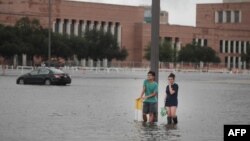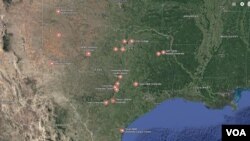Student Union
Harvey Postpones First Week of College on Texas Coast

Flooding in Texas caused by Hurricane Harvey has forced several universities to evacuate their students or cancel classes in the first weeks of the new school year.
Colleges and universities in southeast Texas, where the storm has dumped more than 50 inches of rain, were set to welcome thousands of students — including international students — back to the coastal Houston and Galveston areas, as well as the inland cities of Corpus Christi and San Antonio.
“This continues to be a difficult and challenging time for us all,” said University of Houston President Renu Khator in a statement.
“Houston bayous have crossed their borders, water has entered homes and roads have become unfriendly,” said Khator.
The University of Houston, 50 miles north of the storm’s landfall along the Gulf of Mexico coast, has been severely impacted by high winds, rainfall and flooding.
Housing, food service overwhelmed
University housing and food services have been overwhelmed in the relief effort as the storm affected those on campus and in the surrounding area. The opening of classes has been postponed until September 4.
However, schools have opened their dining facilities during the storm at no charge. Kitchens have been operating 24 hours a day to accommodate incoming students who moved in before Harvey made landfall in the Houston area, according to the university’s webpage.
VOA speaks to University of Houston student
University of Houston "dining halls were open to all students whether you had a meal plan or not," student Sunny Gotewal told VOA. That included free food to those in the community who were displaced, he said.
Classes at Texas A&M’s coastal campus in Corpus Christi — nicknamed the “Island University” because it sits on a peninsula in the Gulf of Mexico — are postponed until at least September 5, officials said.
Most students had not arrived on campus when the storm hit, said university spokesperson Luisa Buttler, but eight students and three faculty members were evacuated to Laredo, about 150 miles to the west.
Rice University in Houston said it is not evacuating students despite heavy flooding, spokesperson B.J. Almond said.
“All of our students are safe,” he said.
University of Houston students have also stepped up to help with storm rescue efforts. Before the National Guard arrived, four students waded through floodwaters to aid elderly residents of Beall Village, a nearby community, reported The Cougar, a student newspaper.
Moved to higher ground
Hadley said he and three other students moved residents to a parking garage on a higher level of the residence.
“The first room that I saw had a lady in a wheelchair," Gotewal told VOA's Student Union. "Water was up to her knees and she couldn't move, and she was just sitting there."
The students helped whom they could, Gotewal said, but couldn't lift the motorized wheelchairs through the high water.
The National Guard arrived and removed other residents, Hadley said.
The University of Texas-Austin is also offering shelter to those affected by the hurricane, said Cindy Posey, UT’s director of internal and safety communication. “UT Austin is honored… to provide the space.”
Students at the University of Texas-San Antonio (UT-SA) have donated more than 50 units of blood in a drive arranged by the student health department. The South Texas Blood and Tissue Center, which is also holding a blood drive on UT-SA’s campus, said it had sent 350 units to the Houston and Gulf Coast area.
The university will host several other events in the coming weeks, including food and clothing drives.
Lorenzo Sanchez, director of UT-SA’s emergency management, said that he is thrilled with cooperation between the university and the San Antonio community.
“We want to make sure we’re doing our part in helping our neighbors in Houston,” Sanchez said.
All students, including international students, are eligible for assistance even if they are not permanent residents of the affected area, said Troy Christensen, external affairs officer for the Federal Emergency Management Agency (FEMA).
Christensen said FEMA is coordinating with the Department of State to offer assistance to international students.
Save documentation
The U.S. Department of Homeland Security (DHS) website urges international students to save documentation to prove their non-immigrant student status, including a passport, visa and I-20 form to provide documented proof of their immigration status. DHS also advises students to have emergency-preparation kits and monitor FEMA’s website.
International students whose visa status could be affected by Harvey must apply for an extension or change of status waiver, if needed, according to the U.S. Department of State’s website.
“Your safety is important to us as well as out commitment to the mission of education. … Please know that we are all in it together — as a family and as a community,” said Khator. “We hope to get back on our feet, help each other and help our community in its rebuilding efforts.”
Zach Rayment and Max Cotton contributed to this report.
See all News Updates of the Day
- By VOA News
Competition grows for international students eyeing Yale

It’s tough to gain admission to Yale University, and it’s getting even tougher for international students as standout students from around the world set their sights on Yale.
The Yale Dale News, the campus newspaper, takes a look at the situation here.
- By VOA News
Student from Ethiopia says Whitman College culture made it easy to settle in

Ruth Chane, a computer science major from Ethiopia, writes about her experiences settling into student life at Whitman College in the U.S. state of Washington.
"The community at Whitman College made sure I felt welcomed even before I stepped foot on campus," she says.
- By VOA News
Claremont Colleges student gets a shock when she heads home to Shanghai

In The Student Life, the student newspaper for the Claremont Colleges, a consortium of five liberal art colleges and two graduate schools in Claremont, California, student Rochelle Lu writes about readjusting to her Shanghai home after spending a semester in the United States.
- By VOA News
Cedarville University aims to ease transition for international students

Cedarville University in the U.S. state of Ohio says it’s got more than 140 international students representing 44 countries.
Here, the school interviews Jonathan Sutton, director of international student services. He talks about his job and the opportunities for international students on campus.
- By VOA News
Morehouse College offers prospective students tips on applying and thriving

Morehouse College, a private, historically Black liberal arts college in the U.S. state of Georgia, offers a guide for international students interested in attending the school.
Among the tips to apply and thrive at Morehouse:
- Take advantage of the school’s orientation program
- Turn to the school’s Center for Academic Success for tutoring, support and more
- Immerse yourself in campus life via clubs and societies
- By Reuters
US reviews Columbia University contracts, grants over antisemitism allegations

The administration of President Donald Trump said on Monday it will review Columbia University's federal contracts and grants over allegations of antisemitism, which it says the educational institution has shown inaction in tackling.
Rights advocates note rising antisemitism, Islamophobia and anti-Arab bias since U.S. ally Israel's devastating military assault on Gaza began after Palestinian Hamas militants' deadly October 2023 attack.
The Justice Department said a month ago it formed a task force to fight antisemitism. The U.S. Departments of Health and Education and the General Services Administration jointly made the review announcement on Monday.
"The Federal Government's Task Force to Combat Anti-Semitism is considering Stop Work Orders for $51.4 million in contracts between Columbia University and the Federal Government," the joint statement said.
The agencies said no contracting actions had been taken yet.
"The task force will also conduct a comprehensive review of the more than $5 billion in federal grant commitments to Columbia University."
The agencies did not respond to requests for comment on whether there were similar reviews over allegations of Islamophobia and anti-Arab bias.
Columbia had no immediate comment. It previously said it made efforts to tackle antisemitism.
College protests
Trump has signed an executive order to combat antisemitism and pledged to deport non-citizen college students and others who took part in pro-Palestinian protests.
Columbia was at the center of college protests in which demonstrators demanded an end to U.S. support for Israel due to the humanitarian crisis caused by Israel's assault on Gaza. There were allegations of antisemitism and Islamophobia in protests and counter-protests.
During last summer's demonstrations around the country, classes were canceled, some university administrators resigned and student protesters were suspended and arrested.
While the intensity of protests has decreased in recent months, there were some demonstrations last week in New York after the expulsion of two students at Columbia University-affiliated Barnard College and after New York Governor Kathy Hochul ordered the removal of a Palestinian studies job listing at Hunter College.
A third student at Barnard College has since been expelled, this one related to the occupation of the Hamilton Hall building at Columbia last year.
Canada’s immigration overhaul signals global shift in student migration
From Europe to North America, nations are tightening their immigration policies. Now Canada, long seen as one of the world's most welcoming nations, has introduced sweeping changes affecting international students. The reforms highlight a growing global trend toward more restrictive immigration policies. Arzouma Kompaore reports from Calgary.
Trump administration opens antisemitism inquiries at 5 colleges, including Columbia and Berkeley

The Trump administration is opening new investigations into allegations of antisemitism at five U.S. universities including Columbia and the University of California, Berkeley, the Education Department announced Monday.
It's part of President Donald Trump's promise to take a tougher stance against campus antisemitism and deal out harsher penalties than the Biden administration, which settled a flurry of cases with universities in its final weeks. It comes the same day the Justice Department announced a new task force to root out antisemitism on college campuses.
In an order signed last week, Trump called for aggressive action to fight anti-Jewish bias on campuses, including the deportation of foreign students who have participated in pro-Palestinian protests.
Along with Columbia and Berkeley, the department is now investigating the University of Minnesota, Northwestern University and Portland State University. The cases were opened using the department's power to launch its own civil rights reviews, unlike the majority of investigations, which stem from complaints.
Messages seeking comment were left with all five universities.
A statement from the Education Department criticized colleges for tolerating antisemitism after Hamas' Oct. 7, 2023, attack on Israel and a wave of pro-Palestinian protests that followed. It also criticized the Biden administration for negotiating "toothless" resolutions that failed to hold schools accountable.
"Today, the Department is putting universities, colleges, and K-12 schools on notice: this administration will not tolerate continued institutional indifference to the wellbeing of Jewish students on American campuses," said Craig Trainor, the agency's acting assistant secretary for civil rights.
The department didn't provide details about the inquiries or how it decided which schools are being targeted. Presidents of Columbia and Northwestern were among those called to testify on Capitol Hill last year as Republicans sought accountability for allegations of antisemitism. The hearings contributed to the resignation of multiple university presidents, including Columbia's Minouche Shafik.
An October report from House Republicans accused Columbia of failing to punish pro-Palestinian students who took over a campus building, and it called Northwestern's negotiations with student protesters a "stunning capitulation."
House Republicans applauded the new investigations. Representative Tim Walberg, chair of the Education and Workforce Committee, said he was "glad that we finally have an administration who is taking action to protect Jewish students."
Trump's order also calls for a full review of antisemitism complaints filed with the Education Department since Oct. 7, 2023, including pending and resolved cases from the Biden administration. It encourages the Justice Department to take action to enforce civil rights laws.
Last week's order drew backlash from civil rights groups who said it violated First Amendment rights that protect political speech.
The new task force announced Monday includes the Justice and Education departments along with Health and Human Services.
"The Department takes seriously our responsibility to eradicate this hatred wherever it is found," said Leo Terrell, assistant attorney general for civil rights. "The Task Force to Combat Anti-Semitism is the first step in giving life to President Trump's renewed commitment to ending anti-Semitism in our schools."
- By VOA News
STEM, business top subjects for international students

The Times of India breaks down the most popular subjects for international students to study in the U.S.
STEM and business lead the pack. Read the full story here. (January 2025)
- By VOA News
Safety and visa difficulties among misconceptions about US colleges

U.S. News & World report addresses some of the misconceptions about U.S. colleges and universities, including the difficulty of getting a visa.
Read the full story here. (January 2025)
- By VOA News
Work opportunities help draw international students to US schools

US News & World Report details the three top factors in foreign students' decision to study in the U.S. They include research opportunities and the reputation of U.S. degrees. Read the full story here. (December 2024)
- By VOA News
British student talks about her culture shock in Ohio

A British student who did a year abroad at Bowling Green State University in Ohio talks about adjusting to life in America in a TikTok video, Newsweek magazine reports.
Among the biggest surprises? Portion sizes, jaywalking laws and dorm room beds.
Read the full story here. (December 2024)
- By VOA News
Harvard's Chan School tells international students what to expect

Harvard's T.H. Chan School of Public Health reaches out to international students by detailing the international student experience at the school.
Learn more about housing, life in Boston and more here.
- By Reuters
China unveils plan to build 'strong education nation' by 2035

China issued its first national action plan to build a "strong education nation" by 2035, which it said would help coordinate its education development, improve efficiencies in innovation and build a "strong country."
The plan, issued Sunday by the Communist Party's central committee and the State Council, aims to establish a "high quality education system" with accessibility and quality "among the best in the world."
The announcement was made after data on Friday showed China's population fell for a third consecutive year in 2024, with the number of deaths outpacing a slight increase in births, and experts cautioning that the downturn will worsen in the coming years.
High childcare and education costs have been a key factor for many young Chinese opting out of having children, at a time when many face uncertainty over their job prospects amid sluggish economic growth.
"By 2035, an education power will be built," the official Xinhua news agency said, adding that China would explore gradually expanding the scope of free education, increase "high-quality" undergraduate enrolment, expand postgraduate education, and raise the proportion of doctoral students.
The plan aims to promote "healthy growth and all-round development of students," making sure primary and secondary school students have at least two hours of physical activity daily, to effectively control the myopia, or nearsightedness, and obesity rates.
"Popularizing" mental health education and establishing a national student mental health monitoring and early warning system would also be implemented, it said.
It also aims to narrow the gap between urban and rural areas to improve the operating conditions of small-scale rural schools and improve the care system for children with disabilities and those belonging to agricultural migrant populations.
The plan also aims to steadily increase the supply of kindergarten places and the accessibility of preschool education.
- By VOA News
A look at financial aid options for international graduate students in US

The Open Notebook, a site focusing on educating journalists who cover science, has complied a list of U.S. graduate program financial aid information for international students.







